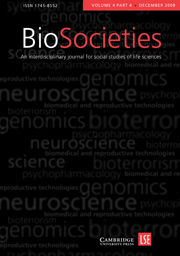Article contents
Editors’ Introduction
Published online by Cambridge University Press: 13 March 2006
Abstract
If the first half of the twentieth century was a golden age for physics, the second half saw the coming of age of the life sciences. As we enter the twenty-first century, our individual and collective lives are being fundamentally altered by developments in cellular and molecular biology. The drivers of these developments, and the stakes in them, are not merely scientific-they are therapeutic, economic, political, ideological and ethical. Put another way, developments in genomics, stem cell research, pharmacology, neuroscience all raise questions, not just about the nature of living processes and their amenability to understanding and manipulation, but also about the forces and ambitions shaping progress in the life sciences themselves, and the ways in which the life sciences are transforming different societies, locally, nationally and globally, in a multitude of different practices from the clinic to the factory.
Information
- Type
- Editorial
- Information
- Copyright
- London School of Economics and Political Science
- 8
- Cited by

